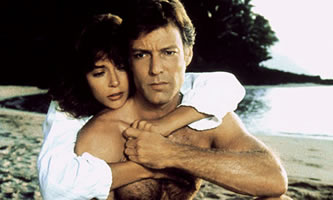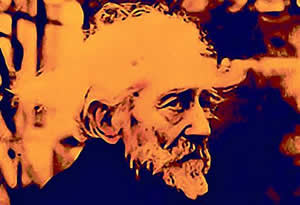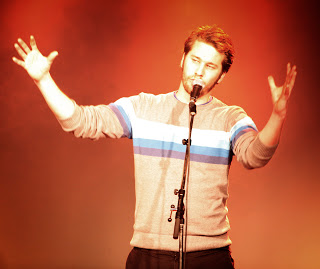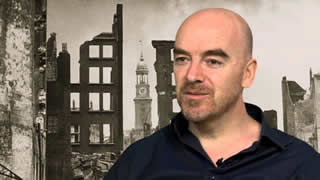De Australische schrijfster Colleen McCullough werd geboren op 1 juni 1937 in Wellington. Zie ook mijn blog van 1 juni 2009 en eveneens alle tags voor Colleen McCullough op dit blog.
Uit: The Thorn Birds
“The doll’s golden hair tumbled down, the pearls flew winking into the long grass and disappeared. A dusty boot came down thoughtlessly on the abandoned dress, smearing grease from the smithy across its satin. Meggie dropped to her knees, scrabbling frantically to collect the miniature clothes before more damage was done them, then she began picking among the grass blades where she thought the pearls might have fallen. Her tears were blinding her, the grief in her heart new, for until now she had never owned anything worth grieving for.
Frank threw the shoe hissing into cold water and straightened his back; it didn’t ache these days, so perhaps he was used to smithying. Not before time, his father would have said, after six months at it. But Frank knew very well how long it was since his introduction to the forge and anvil; he had measured the time in hatred and resentment. Throwing the hammer into its box, he pushed the lank black hair off his brow with a trembling hand and dragged the old leather apron from around his neck. His shirt lay on a heap of straw in the corner; he plodded across to it and stood for a moment staring at the splintering barn wall as if it did not exist, his black eyes wide and fixed.
He was very small, not above five feet three inches, and thin still as striplings are, but the bare shoulders and arms had muscles already knotted from working with the hammer, and the pale, flawless skin gleamed with sweat. The darkness of his hair and eyes had a foreign tang, his full-lipped mouth and wide-bridged nose not the usual family shape, but there was Maori blood on his mother’s side and in him it showed. He was nearly sixteen years old, where Bob was barely eleven, Jack ten, Hughie nine, Stuart five and little Meggie three. Then he remembered that today Meggie was four; it was December 8th. He put on his shirt and left the barn”.

Colleen McCullough (Wellington, 1 juni 1937)
Scene uit de tv-serie met Richard Chamberlain en Rachel Ward, 1983
De Argentijnse schrijver Macedonio Fernández werd geboren op 1 juni 1874 in Buenos Aires. Zie ook mijn blog van 1 juni 2009 enook mijn blog van 1 juni 2010.
Uit: From The Museum of Eterna’s Novel (Vertaald door Margaret Schwartz)
“Horrible art and the accumulated glories of the past, which have always existed, are a result of the following: the sonorousness of language and the existence of a public; without this sonorousness, only thinking and creating would remain; without a clamoring public, art would not be drowned. Under these conditions, Literature would be pure art, and there would be many more beautiful works than there are at present: there would be three or four Cervantes, the Cervantes of the Quijote, without the stories, Quevedo the humorist and poet of passion, without the moralizing orator, various Gómez de la Sernas. We’ll be liberated from the likes of Calderón, the Prince of falsetto, from lack of feeling, which is poor taste itself; from the likes of Góngora, at least from time to time, with his exclamations of “Ay Fabio, o sorrow!” We’d have three Heines, each of sarcasm and sadness, or D’Annunzios to limitlessly versify passion. Happily, we would have only the first act of Faust, and in compensation various Poes, and various Bovaries—with their sad affliction of loveless appetite, despicable and bloody—and this other, lacerating absurdity: Hamlet’s lyric of sorrow, which convinces and breeds sympathy, despite the false psychologism of its source. We’ll be free of the scientific realism of Ibsen, one of Zola’s victims, and this magnificent artist for his part will be dismantled by sociology and theory of heresy and pathology, and instead of a dozen master works we’ll possess a hundred, of true, intrinsic artistic worth, not mere copies of reality. These works will be typically literary, works of Prose, not of didactics, without any musical language (meter, rhyme, sonorousness) or paintings with words, that is, descriptions.”

Macedonio Fernández (1 juni 1874 – 10 februari 1952)
Onafhankelijk van geboortedata:
De Nederlandse dichter Dennis Gaens werd geboren in Susteren in 1982. Zie ook alle tags voor Dennis Gaens op dit blog.
veertig graden
als we de kou hierbinnen
de ruimte geven
en onze koorts buiten
op straat laten spelen
ons zweet tussen
de groeven van klinkers
en door blaren in het asfalt
omhoog laten komen
de straat overstromen
lantaarnpalen laten smelten
dwars over de weg alleen
de stoep begaanbaar houden
met onze ruggengraat
door drempels breken
het bestemmingsplan
laten getuigen van
de onrust in onze botten
als we onze koorts
in straten laten razen
zijn we 38, 39, 40
dichterbij de zon

Dennis Gaens (Susteren, 1982)
De Britse schrijver Rhidian Brook werd geboren in 1964 in Tenby. Zijn eerste roman “The Testimony Of Taliesin Jones” won drie prijzen, waaronder de 1997 Somerset Maugham Award, en werd verfilmd met in de hoofdrol Jonathan Pryce. Zijn tweede roman “Jesus And The Adman” werd gepubliceerd in 1999. Zijn derde roman “The Aftermath” verscheen in april 2013. Zijn korte verhalen zijn gepubliceerd door The Paris Review, Punch, The New Statesman, Time Out en andere tijdschriften, en verschillende ervan werden uitgezonden op BBC Radio 4’s Short Story. Zijn eerste opdracht voor de televisie – “Mr Harvey Lights A Candle”- werd uitgezonden in 2005 op BBC1 met Timothy Spall in de hoofdrol. Brook schreef ook voor de BBC serie Silent Witness tussen 2005 en 2007, en de dramaproductie Atlantis voor BBC1 in 2008. Africa United, zijn eerste lange speelfilm kwam in het Verenigd Koninkrijk uit in oktober 2010. Brook schreef eveneens artikelen voor kranten, waaronder The Observer, The Guardian en The Daily Telegraph. In 2005 presenteerde hij Nailing The Cross, een documentaire voor BBC1. In 2006 werkte hij mee aanj een serie “In The Blood” van BBC World Service, en filmde hij de reis van zijn familie door de aids-pandemie. Zijn boek over die reis – “More Than Eyes Can See”- werd in 2007 gepubliceerd door Marion Boyars. Ook levert Brooks al meer dan 12 jaar regelmatig bijdragen aan Radio 4’s “Thought For The Day.”
Uit: More Than Eyes Can See
“Our biceps were still aching from the final round of jabs when we arrived in the rural Kenyan town of Kithituni, where the Salvation Army had pioneered a communal response to HIV/Aids. We had been inoculated against a host of deadly diseases. We had learned all about the pandemic, explained to Gabriel and Agnes how HIV passed from one person to another, read books and talked to people trying to get a sense of what life would be like in the communities we were going to. Most of what we knew about Africa lay between the dualities of safari and catastrophe, between the writings of the starry-eyed accounts of settlers, naturalists, hunters and alarming news reports, movies and documentaries. None of it really prepared us for what we found.
There were immediate cultural adjustments to make and material discomforts to face: no cars, a “goat-powered” internet, pit latrines for toilets, no fridge (we only had power for three hours a day), no running hot water, and a limited amount of food produce consisting mainly of scrawny chicken, beans, rice and the maize breeze-block otherwise known as ugali. There were big bugs to worry about and an over-neurotic applic ation of Deet at sundown, but we adjusted quickly and the kids seemed to be enjoying it as much as we were. It was the people who made it easy.
Every day, the chief patriarch and matriarch in the area – Jonathan and Agnes (every other woman seemed to be called Agnes in Kithituni) – would swing by on their way to market to check that we were OK; hordes of children would come to play football with our children (with a football made from plastic bags and string) or play with Gabriel’s Gameboy until the power ran out. George the baptist would stop off for tea, deliver his home-grown onions and discuss some finer theological point. Lelu showed us how to kill the army ants that walked in through the front door at exactly 7pm every night. And on the 45-minute walk to market we’d learn Swahili by practising the local greetings 100 times a day. By the time we had bought the children two goats at Friday market (we called them Malarone and Larium after the malaria tablets) we were well and truly part of the community and able to thank God in three more languages.”

Rhidian Brook (Tenby, 1964)
